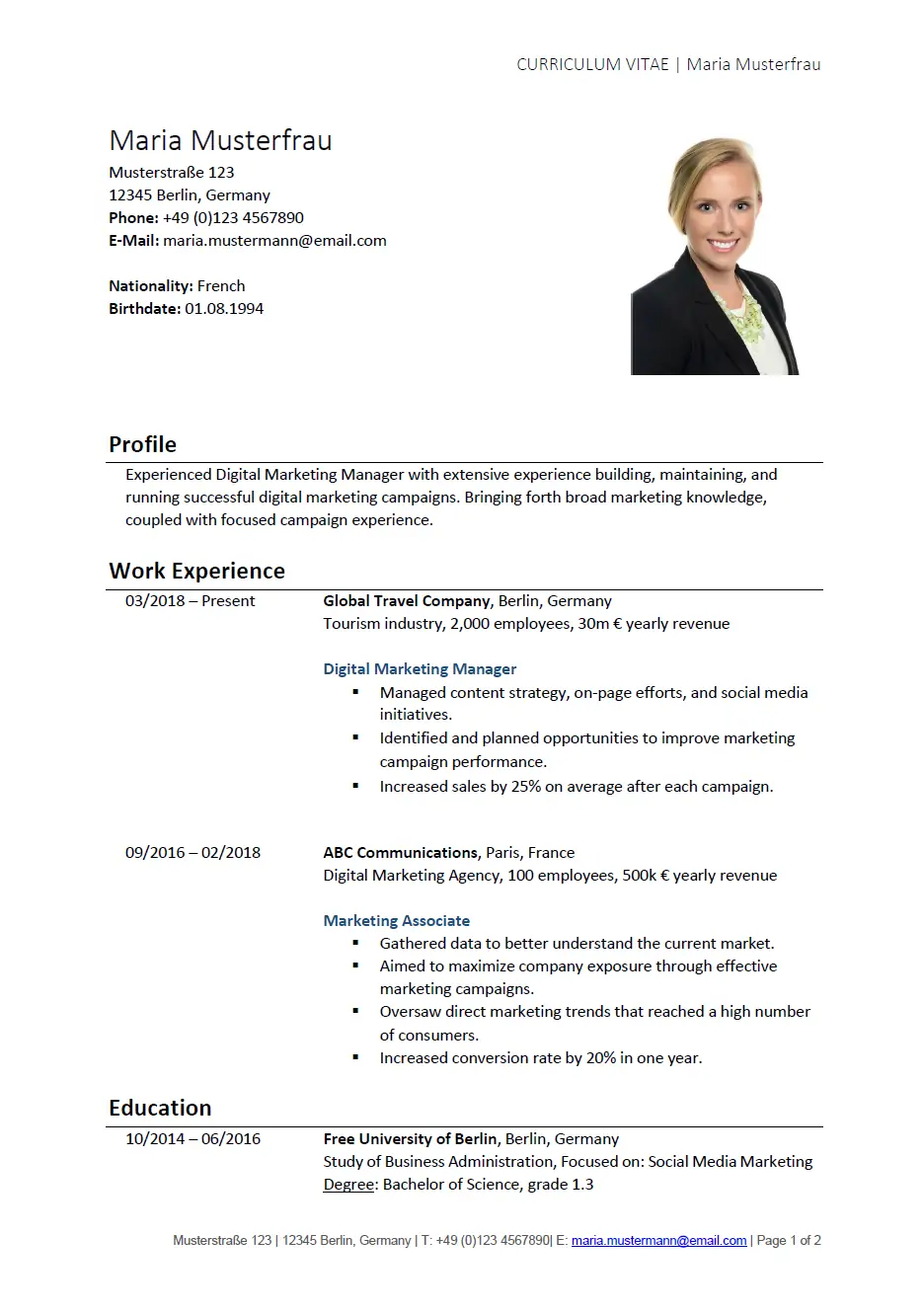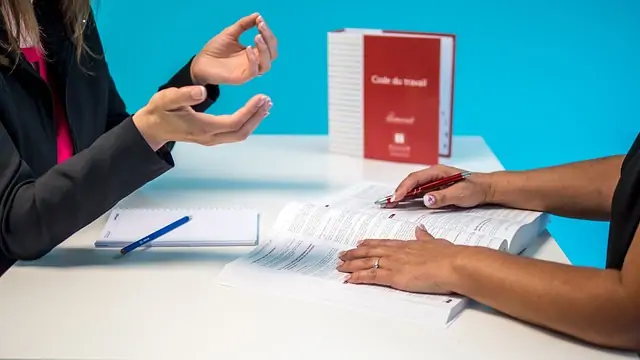This post contains affiliate links. It means that if you click on the links and make a purchase, we will receive a small commission at no additional cost to you. This allows our blog to continue providing you with free information. We only include links and products that we truly believe in. You can read the full disclosure here.
Moving to Germany or new in Germany? Check out our Resources Page for all the help you need!
Looking for a job in Germany and not sure how to write your CV? You are at the right place. In this guide, you will get all the details about how to write your CV that fits the German job market. You will learn about the structure, length, style, and the different sections contained in a CV in Germany. I also include a free CV template for you to use and land your dream job in Germany!
Table of Contents
ToggleIntroduction
Planning to move to Germany? Or are you already living in Germany? One big challenge for many expats is to look for a job in Germany. If you have been applying for jobs in Germany for a long time without success, maybe it is time to have a review on your CV.
Your potential employer gets the first impression of you from your CV. Customizing your CV to suit the German job market can highly increase your chance of getting hired.
The CV structure in Germany can be different from that of your home country. Simply translating your current CV into German is not sufficient. You should make sure that you use the German CV format when applying for a job in Germany.
Note that there is no one best way to write a CV. In this guide, I will provide some general ideas about how to write a CV that best suits the recruiting culture in Germany. For some other useful guides about getting a job in Germany, check out the below:
- Job interview in Germany: 6 tips to boost your chances of getting hired
- Salary in Germany: Are you getting paid enough?
Get a free CV review
Do you already have a CV? If yes, I would highly recommend you to get a free CV review. To be honest, I was not so enthusiastic at the beginning about getting a CV review because I thought my CV looked good.
I was impressed by how comprehensive the CV review was. I got a long analysis on my CV, highlighting the weak points and how I could improve them.
Do you know that 93% of all hiring managers use CV scanning software to filter candidates from the application pool?
This software extracts data from your CV and creates a short summary of you for the hiring managers. It also extracts all the keywords about your skills and competencies.
What this software shows to the hiring managers will determine if the hiring managers want to know more about you and invite you to the interview.
What I found really interesting in this CV review is that I can see how the CV scanning software presents me in front of the hiring manager. I realized that the top keywords and skills shown in this software were not really those I wanted the hiring managers to see.
Instead of focusing on accounting and finance (my area), I had keywords like “customer service” and “pricing”. I realized that I had a lot of work to do to amend my CV if I want to apply for an accounting and finance job.
That is why I would highly recommend you to do the same and get a free comprehensive CV review from trusted experts. You will get objective feedback on your skills and expertise, and also personalized recommendations on your CV. And the best part? It is free!
Should you write your CV in English or German?
It depends. Unless it is specified in the job posting, it is better to send a German CV. But you should only do that if your German level is good enough.
If you are still struggling with the language, sending a German CV will give your employer the wrong representation of your German skill level. Your employer will find out anyway once you are invited to the interview. So, only send a German CV if you can handle your interview in German.
If your German is not very advanced yet, I would recommend sending an English CV instead (following the German CV format). You can indicate in your English CV your current German level and that you are learning the language. In the meantime, you can use some free apps or try some of my secret fun ways to learn German.
Besides, it is super important to have a CV free of spelling and grammar mistakes. This can be challenging if your German level is not yet sufficient. If you decide to send a German CV, make sure you find a native German speaker to proofread your CV before sending it out. For example, Lingoking provides CV proofread service at a low price.
In my case, I applied to many jobs in Germany back then when I still could not speak German. I have only sent out English CVs and targeted those job postings which were written in English. You can read here how I got my English-speaking job in Germany.
Looking to join a German class?
Even if you work in a company that uses English as the company language, it is almost unavoidable that you will need some German sometime. Therefore, don’t forget to learn German during your job hunting process and even after getting your job.
If you are looking for a class, I can highly recommend the Lingoda German classes. You can take online classes with qualified native German teachers at any time from anywhere in the world. Y
ou can book classes 24/7. The only thing you need is your computer and a stable internet connection. I write about it here: Lingoda Review – My Honest German Learning Experience
You can try Lingoda out for free with a 7-day trial with no risks. Don’t forget to use my code “lifeingermany” to get a 30% off if you decide to join the classes!
How to write a CV (Lebenslauf) in Germany?
A CV, or CURRICULUM VITAE, is called “Lebenslauf” in German. It is a more commonly used term in Germany instead of a “resume”. In fact, German people usually use the term “CV” and “resume” interchangeably.
The CV is the most important document of a job application in Germany. It is the first impression you give to the potential employer.
As your potential employer is probably reviewing dozens of CVs of other applicants on the same day, he only has a few seconds to decide if he should continue reading your CVs.
In fact, an employer only looks at CVs for 6 to 7 seconds on average. Therefore, it is important to send a perfect CV so that you can stand out from the crowd.
As you probably know, Germans are direct, straightforward, and efficient. The same applies to their CVs. In Germany, CVs are simple factual documents that list out all the work experience, education, and skills.
It is not a sales pitch and you should just state the facts without any fluff. Avoid any self-promoting sentences and keep your CV clear, concise, and simple.
Your CV should be well-organized and make it easy for the employer to spot all the information he needs in the shortest amount of time.
Your CV does not need to have a colorful and fancy design. But it should be easy to read and help to save your employer’s time. Employers love CVs in a simple and readable format.
Read also: 20 Ideas to Make Money from Home – Anyone Can Do
Use a CV builder
If you are creating your CV from scratch, you may want to consider using a CV builder like resume.io. Resume.io lets you select a CV template and edit your CV online easily. It also has a spell-checker that takes care of the grammar for you. The website is simple to use and all in English.
Another nice thing about resume.io is that you can use pre-written phrases tailor-made for your own profession. You can refer to these pre-written phrases to get some inspiration when writing your CV.
Besides, resume.io is free for basic use. There is also a paid version if you want some extra features.
The length of your CV in Germany
In Germany, your CV should have a maximum of two A4 pages. Making all your information into one or two pages shows that you can prioritize the most important information and be concise. This is an important skill needed in many jobs.
Besides, as mentioned before, hiring managers spend on average 6 to 7 seconds when looking at a CV. A too lengthy CV is not appealing. Your CV should be short and sweet so that the hiring managers can get the most information out of it within the shortest period.
Read also: Invest in Germany to Make Money – English Guide
CV in Germany – Layout and format
German employers like simple CVs, without many different colors, font sizes, and styles. So, keep away from special fonts and colors. Use simply the standard font and size.
You should have the same style throughout your CV. If you want to highlight something, use bold or italics. But make sure not to overuse them.
If your CV is more than one page, make sure your name appears clearly at the top of each page.
Read also: 9 ways to earn money in Germany as a student
CV structure in Germany
In Germany, it is important to put the information in the right order. The CV in Germany is usually structured in the below way:
- Personal information
- Personal profile statement (optional)
- Work experience
- Education
- Other skills/ achievements (optional)
- Hobbies and interests (optional)
- Your signature
1. Personal information (Persönliche Angaben)
This should be the first section of your CV. In this section, you have to list your personal details. Some of these details are compulsory, while some are optional.
Personal details that you must include
(a) Your first and last name
Your name should be the title of your CV. You can add a header and put your name on the top of your CV using a bold or larger font size. In Germany, people usually do not use the word “CV” or “Resume” as the title.
Besides, people usually have one first name and one last name in Germany. If you have more than one first names, try to use the one that you prefer people to call you.
In my case, I have 3 first names. But I prefer people to just call me Sindy because it is simple and easy for people to pronounce and remember. Therefore, I prefer to put only “Sindy” as my first name in my CV.
(b) Address
You must include your address in your CV. Don’t forget to mention your country as well!
Optional personal details
Although the below details are optional, it is common in Germany to include them in a CV. Note that it is illegal for companies to make hiring decisions based on your age, race, gender, and sexual orientation.
(a) Date of birth
You should use the German date format: DD.MM.YYYY
(b) Your nationality
This is so that your employer knows if he needs to sponsor a visa or work permit for you.
(c) Marital status
This helps your employer to get a full picture of you. In the past, people also mention the number of children in the CV. But it has become more uncommon nowadays.
(d) Your phone number
Don’t forget to include the correct country code in front of your phone number.
(e) Your email address
It is better to use a professional email address that contains your name.
(f) Your website or professional online profile
For example, your professional social network like Linkedin or Xing profile. You can also include your professional website if you have any.
(g) Your photo
In Germany, it is common to include a small photo in your CV. This picture is usually put in the top right-hand corner of your CV.
Even though it is not mandatory, it is common to do so in Germany and the employer will use this photo to judge your professionalism. Your photo serves as a first physical impression of you and helps your employer to attach a face to your name. Therefore, it is important to use a professional photo with good quality.
Your photo should be a current one and a professional headshot (only from your shoulder up). Below are some more tips about taking your photo:
- Wear neat clothes
- No selfies!
- Use a simple background
- Never use holiday pictures, party pictures, or other personal pictures. Your picture should be work-appropriate in a business format.
Remember, your photo should be a good representation of yourself in a working environment. The best is to ask a professional photographer to help. It is expensive but it is worth it. I paid for my professional headshot as well. And it looks so much better than the one I tried to take at home myself!
2. Personal profile statement (Profil)
You can put a profile section right after your personal information section in your CV. Your profile is a short summary of your specific skills, experience, career goals, strength, credentials, and qualifications.
Give some concrete examples but don’t put too many details in this section. It should only be a few sentences, highlighting why your employer should choose you. You can leave your details in the cover letter.
Even though this section is optional, your profile is a short description of yourself and it can give your employer some ideas about your professional history and story.
Read also: How To Write Your Cover Letter in Germany (+ English Example!)
3. Work experience (berufliche Erfahrung)
You should list your work experience in reverse chronological order, meaning that you start with your most recent one. For each of the positions, you should include
- The name of the company
- The location of your position
- The dates you worked there (month and year)
- Your position title
- The types of work, e.g. part-time, full-time, internship, etc.
- Your key responsibilities (use short bullet points to list 3 -5 of them)
- Your achievements
In some cases, you may want to include some description of your former company, e.g. company size, industry, etc. This can help your potential employer to understand your CV better, especially if he is not familiar with your former companies located in your home country.
When describing your achievements, use strong and active language. Also, instead of using a general description, translate your achievements in terms of quantity. For example, increase revenue by 30%.
Employment gap
In case you have any employment gaps, be sure to explain that. For example, you should mention that if you took a year off between your jobs to go abroad on a working holiday.
Internships and voluntary work
In Germany, it is common to include any internships or voluntary work experience in the work section as well.
Some types of volunteering work can show your skills and ambition. Just make sure that the skills you gained from volunteering work are relevant to the job that you are applying for.
Only include relevant jobs
Besides, don’t feel the need to list all the details of your work history. You should only include jobs that are relevant to the position you are applying for.
For example, if you are applying for an accountant job now, you do not have to include your bartender job on the weekend during your studies. Only include information that shows that you have the right skills and expertise for your employer.
4. Education (Ausbildung)
In this section, you can include your secondary and higher education. You should include the period (month and year), the place, and the program you studied at your university. You can also include the special area of study in your program if that is relevant to the position you are applying for.
For example, if your degree was in Business Administration, but you specialized in Social Media Marketing, make sure to mention that. Besides, you should mention your most recent studies first.
You can put this section either before or after the work experience section. If you have just graduated and do not have much work experience yet, you may want to put the education section first to impress your employer with a strong academic background.
The grading system in Germany
You should include your final grades in this section too. Note that in Germany, the grading system can be different than your home country.
When I did my Master’s studies in Germany, I got a note “4” out of “5” for one exam. I was happy because I thought “5” was the full mark and “4” seemed to be pretty good. It was only later I found out that “5” was the worst and “1” was the best.
In Hong Kong, our grading system consists of letter grades and GPA, with “4.0” being the best and “0.0” being the worst. To avoid confusing your employer, I would add in my CV an equivalent German grade as well, so that my employer will not think that I have a bad grade with a GPA of “4.0”!
In the below table, you can see a rough translation of the German grades to GPA and letter grades:
German Grade | Meaning | Letter grade | GPA |
1.0 | Sehr Gut (Very Good) | A | 4.0 |
2.0 | Gut (Good) | B | 3.0 |
3.0 | Befriedigend (Satisfying) | C | 2.0 |
4.0 | Ausreichend (Sufficient) | D | 1.0 |
5.0 | Nicht ausreichend (Insufficient) | F | 0.0 |
5. Other skills/ achievements (Sonstiges)
This section is optional. If you want to let your employer know of anything that does not belong to other sections in the CV, you can add it here. You can list any other skills, qualifications, or achievements that are relevant to the position.
For example, language skills, computer skills, awards, scholarships, professional licenses, or certifications. If you are a researcher, you should also include a list of your publications in the CV.
(a) Computer skills
It is important to mention any IT skills you have, especially if those skills are required by the job. In a job posting, the employer will usually state some IT requirements, and applicants who are familiar with certain IT tools will be preferred. For example, SAP, Oracle, Microsoft Office, etc.
(b) Scholarships
This is more important for fresh graduates, who do not have much work experience yet. Including your scholarships can help you to stand out from other applicants applying for the job.
(c) Professional license
If you are applying for a sales job that requires you to travel frequently, you should indicate you have a driving license here. If the job posting states that a licensed accountant is needed, you should include your license here.
(d) Language skills
You can include any language that you know here. You can use the standards of the Common European Framework of Reference for Languages (CEFR) as a guide.
CEFR level | Meaning |
A1 | Beginner |
A2 | Elementary |
B1 | Intermediate |
B2 | Upper Intermediate |
C1 | Advanced |
C2 | Proficiency |
Since not every employer may know about the CEFR level, I would recommend writing like this: “English – Advanced (C1)”, “German – Intermediate (B1)”.
6. Hobbies and interests
Even though this section is voluntary, mentioning your hobbies and interests shows that you have good time management and can achieve a work-life balance. It also shows your character as a whole.
It is common to add this section to your CV in Germany. Just make sure that your hobbies/ interests are relevant to the position that you are applying for. They can provide evidence of your previously mentioned skills. Remember to make this section short and specific.
7. Your signature
Germans love signatures. You should sign your CV along with the date and place at the end of your CV (in the bottom left corner).
Free CV template to use in Germany
Want to have a feeling how a CV looks like in Germany? Here you go.


You can also download this template for your own use here.
Applying for a job in Germany
When applying for a job in Germany, you will probably need to send your application documents in PDF format to an email address. Or you have to upload them directly to the company’s website.
Before submitting your application, read the job posting carefully again to see what kinds of documents are required. While some companies require only your CV, it is very common for other companies to ask for your cover letter and other supporting documents as well.
Below are some of the commonly requested documents:
- Your CV
- Your cover letter
- Your reference letters
- Your graduate certificates
Reference letters in Germany
In Germany, it is not common to put the contact details of your former managers in the CV. Instead, references come in written form called reference letters (Arbeitszeugnis). Make sure you request your reference letter once you leave a job in Germany.
Fun fact: According to German law, the reference letter should not mention any negative aspects of the employees which may hinder them to find their next jobs. On the other hand, the letter should also be true and objective.
Over time, employers in Germany invented a very creative way to write reference letters by using some kind of “special coding”. You may find your reference letter very positive if you are not familiar with this “coding system”. To learn more about this topic, check this out: Decoding your Reference Letter in Germany
Attach your certificates
You should attach your most important certificates to the application documents. Some examples include your university graduate certificate or your professional license.
In case your certificates are not in English or German, you will have to translate your documents. For certain documents such as your graduate certificate, you may even need them to be certified.
The easiest way is to use the service from Lingoking. It provides professional translation and certification services. All online and at a low cost.
13 Tips to write your CV in Germany
To summarize, below are some tips on how to write your CV that fits the German job market. Follow them to have a better chance to land your dream job in Germany.
13 tips to write your CV:
- Remember that a CV in Germany is more of a factual statement than a marketing tool. Keep it factual and avoid any fluff.
- If you put your photo in the CV, make sure it is current and professional.
- Only list those skills, experiences, and qualifications that are relevant to the job you are applying for.
- Keep your CV concise. Fit it in one page if you can. And no more than two pages.
- Use a standard font size and color. Avoid too many different font styles. Employers in Germany focus more on the structure and content of your CV. They like to see CVs that are simple and clear.
- Make sure to follow the CV structure explained in this guide when applying for a job in Germany.
- When listing your experiences and achievements, use short bullet points. Stay to the point and only mention relevant information.
- Avoid using abbreviations. Not everybody understands what they mean.
- Do not use the same CV to apply for a different job. You need to tailor-make your CV to suit each application depending on the job requirement. Write what the employers would like to read (but of course, it has to be true!). Get a free CV review before sending out your CV!
- If you are looking for a particular position, read a few job postings for that position to see what is the common skillset required by the employers. Make sure to include those keywords in your CV.
- Explain any employment gaps you have in your CV.
- Make sure there are no spelling and grammatical errors on your CV. Ask someone to proofread it before sending out your CV. Or send it to a professional who can help to proofread and correct it.
- Update your CV whenever something changes. Your CV should be current.
CV in Germany – Conclusion
Your CV plays a major role in whether you get a job or not. It is the first impression you give to your potential employer. Therefore, it is important to make it correct. Your CV should be clear, concise, informative, and relevant.
I hope this guide is helpful and you have now a good idea of how you should write your CV. Best of luck with your job hunting in Germany!
Pin it for later:

Moving to Germany or new in Germany? Check out our Resources Page for all the help you need!
If you found this article helpful, consider supporting this website by buying me a coffee. Every small donation helps to keep this blog alive. You can also ask me any questions here. Buy me a coffee










Dear Author,
thanks a lot for the useful article.
Because of the corona, I spend over 1, 5 years in my home country and just back in Germany.
To be honest, as my german university offered us online study before, I stayed at home to study and help my parents without official work in my home country.
My question to you is
How to competently explain such 2-year unemployment gaps that had in my CV??
Moreover, I almost finished my german study therefore now I’m trying to find a relevant job in Germany as for working student without speaking German fluently.
Thanks in advance for your response.
Thanks for your comment. If you are studying, it is not an unemployment period. Simply state in your CV that you are studying during that 2 years. Regarding job hunting in Germany, you can check out this post. Hope it helps!
Hie thank you for the information. I have a question which lm hoping you may provide a solution. I have been doing the same job for the last 5 years and l really need to change my career and try to get company based vaocation jobs in Germany. My problem is the gap is too big how should l write my CV and explain it in case an interview follows up.
Thank you for your advice
Thanks for your comment. If you want to change a career, I think it is good to explain why and demonstrate how you can fit to your new career. What skills did you get during the last years that can help you in the new career? What actions did you do to demonstrate your desire and skillsets for your new career? Maybe you have been training/ studying in the evening or weekend for the new career job? I cannot give you personalized advice as I don’t know your exact situation. If you need professional advice, I suggest you to try the CV review/ writing service mentioned in my article. They are professional who can help you with your CV and cover letter and guarantee that you get an interview. Hope it helps!
Sorry forget to mention that the job is not related to what l hope to do in the future